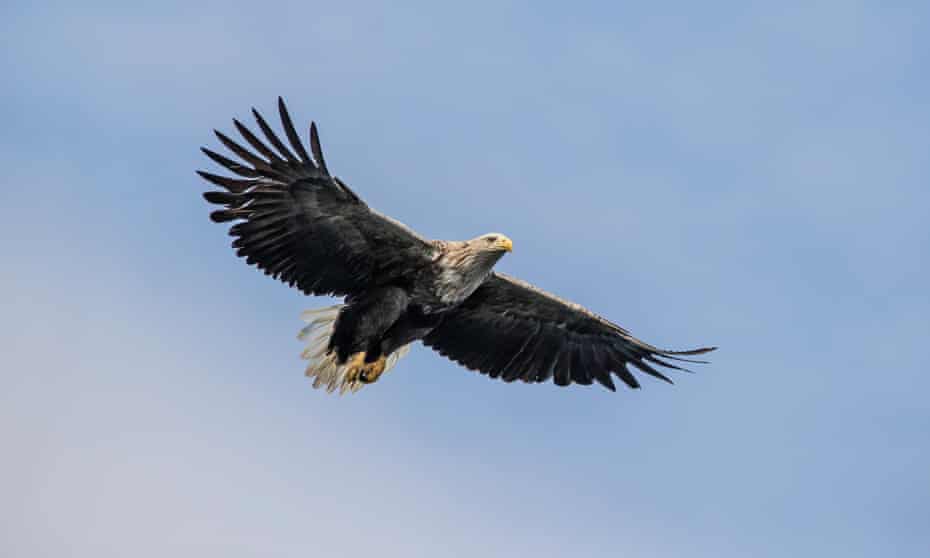Norfolk white-tailed eagle reintroduction project cancelled
Cancellation follows reports local estate owners were worried about predator’s impact on other birds

A pioneering project to return white-tailed eagles to Norfolk for the first time in 200 years has been cancelled at the last minute to the dismay of conservationists.
The UK’s largest birds of prey were to be released at Wild Ken Hill, the estate that is home to the BBC’s Autumnwatch programme, from next year, with plans to set 60 birds loose over 10 years.
A survey found 91% of local people supported the plans and almost GBP10,000 was raised through crowdfunding. The estate asked for money to relocate the birds from Poland and build them a temporary home in the grounds while they got used to their new habitat.
Natural England insiders said they were disappointed by the project’s cancellation and said the decision was not theirs.
Sources told the Guardian that local estate owners were worried that the eagles would predate rare wading birds on the wetlands in north Norfolk, as well as interfere with shooting interests by eating pheasants and partridge. There was also vocal opposition from some farmers, who feared the eagles would kill livestock including lambs and piglets.
White-tailed eagles, which have a two-metre wingspan, were extinct in Britain by the early 20th century as a result of persecution, and there is no breeding population in mainland England. The birds were reintroduced to Scotland from the 1970s and to the Isle of Wight in 2019.
The scheme, which was greenlit by Natural England, was masterminded by the north Norfolk estate along with the eagle expert Roy Dennis and garnered widespread support and coverage, including, it was rumoured, from Prince Charles, who runs the nearby Sandringham estate.
A Wild Ken Hill spokesperson said: “We continue to believe that the restoration of white-tailed eagles to eastern England is an important and inevitable conservation goal, and also that the original plans for a release beginning in 2022 could have been delivered very successfully. We have, however, taken the difficult decision to focus on other aspects of our nationally significant nature and regenerative farming project.”
Rob Wise, the National Farmers’ Union’s East Anglia environment adviser, said earlier in the process: “During an online meeting with the project proposers, farmers expressed concern about the impact these predators could have on the large numbers of free-range livestock in Norfolk as well as those in Cambridgeshire, Suffolk and Lincolnshire.
“This eastern area is home to around half of the country’s outdoor reared pigs and poultry and also has a significant amount of sheep grazing.”
Wild Ken Hill had to receive permission from some of its neighbours for the scheme to go ahead and it is believed Sandringham estate did not oppose the plans, despite the Prince of Wales’s organic sheep farm operating there. Wild Ken Hill said it was given the go-ahead after a feasibility study and a public consultation that showed there were high levels of local support, including from farmers.
Six of the birds released on the Isle of Wight have spent time in Norfolk in the past year, but conservationists say it would take a long time for the species to increase its population and recolonise East Anglia without help.